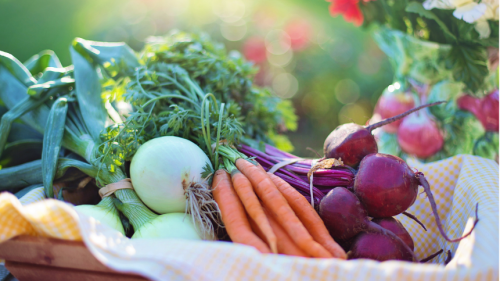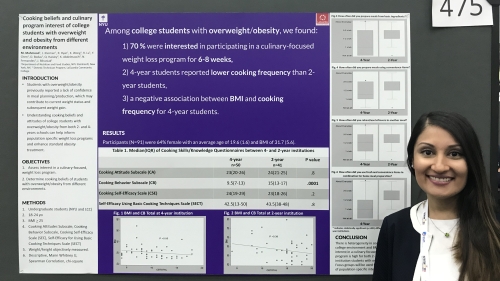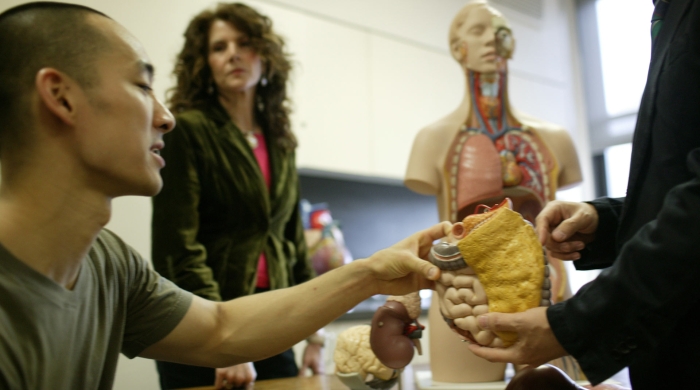
For many undergraduate students, going to college means being independently responsible for their own meals and nutrition for the first time in their lives. At the same time, research suggests that overweight/obese college students have low confidence in their own abilities to prepare meals – and an interest in participating in culinary weight loss programs.
With this information in mind, Miriam Mahmood – who recently graduated with her PhD in Nutrition and Dietetics and has 10 years of experience as a registered dietitian nutritionist – set out to design a research study exploring the feasibility and outcomes of an internet-based, culinary behavioral weight loss program for NYU undergraduate students.
Working with the Department of Nutrition and Food Studies and the NYU Dietetic Internship, Dr. Mahmood launched a 6-week Dietary Intervention and Culinary Education (DICE) program in the Fall of 2020 – read on to learn more about her research and findings.
What inspired you to research this topic and focus on college students?
As a registered dietitian who has provided nutrition education to patients with overweight and obesity over the past 10 years, I knew that one important life skill for weight management is cooking knowledge and healthy meal preparation.
Undergraduate college students with overweight and obesity are an understudied population that could potentially benefit from culinary interventions. Research has shown that behavioral weight loss programs including college students 18–24 years old have had difficulty with recruitment, engagement, retention, and weight loss outcomes. In addition, behavioral weight loss programs with college students have not included a culinary component within their programs. For a number of students, this is the first time they are responsible for their own meals, and helping them gain basic culinary skills may empower them to create balanced meals and maintain a healthy weight.

Mahmood standing in front of her poster at the Nutrition 2019 conference.
What did the DICE program look like for participants?
The program lasted six weeks and was delivered via Zoom. Sessions involved 20 minutes of nutrition education, 30 minutes of culinary education with a culinary activity, and 10 minutes of goal setting and feedback. DICE included evidence-based behavioral weight-loss strategies such as goal setting and self-monitoring of weight, dietary intake, and physical activity using the MyFitnessPal application.
Participants received a scale to measure weight, a tape measure to measure height, culinary utensils (a cutting board and cup/spoon measures), Instacart e-gift cards to purchase groceries, and monetary incentives via Zelle. In addition, participants received four text messages weekly (on self-monitoring, goal check-in, nutrition education, and diet/exercise).
How did the pandemic impact your approach to the research?
When planning this program over the last four years, I initially envisioned conducting it in person. However, due to COVID-19 and restrictions on in-person research, I took this as a positive opportunity to use novel methods and incorporate technology into the program. I was then able to successfully transition the program to an internet-based platform for the Fall 2020 semester.
What did you find?
I used a one-group pretest-posttest design with a mixed-methods approach to assess feasibility (sample characteristics, recruitment, resources, program adherence), culinary, nutrition, weight and physical activity outcomes, and to identify facilitators/barriers to program adherence.
I found that participants were 69% female, 77% non-Hispanic/Latino, 31% Asian, and 23% Black/African American. The program was low-cost and 48% of participants attended sessions and submitted goals for at least 4 of the 6 weeks.
Perceived culinary skills/nutrition knowledge and cooking attitudes/self-efficacy increased and weight and sitting time decreased during the study. Qualitative findings showed that facilitators to program adherence were optimal timing of sessions, cooking in their own kitchen, and accountability. Barriers to program adherence were insufficient culinary equipment and time to submit goals/self-monitor, the fast pace of the culinary educator, the desire for more grocery options, and the inconvenient timing of sessions.
For a number of students, this is the first time they are responsible for their own meals, and helping them gain basic culinary skills may empower them to create balanced meals and maintain a healthy weight.
What do you hope will be the impact of this research? Will you be pursuing any elements further in the future?
These findings provide the preliminary data future studies can use as the groundwork and rationale to further explore behavioral weight loss programs for college students with overweight and obesity. Understanding and promoting culinary and nutrition education in the undergraduate college student population is vital to decrease their risk of overweight, obesity, and chronic disease development in mid-to-late adulthood. Recruitment efforts to increase diversity and providing additional culinary equipment, grocery choices, and time should be incorporated into future programs and I hope to incorporate this program in diverse college settings. The promising findings of this feasibility study provide the support to guide the development of a fully-powered randomized controlled trial.

